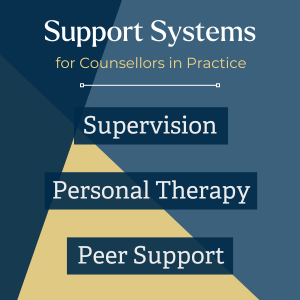Trauma Informed Practice Course
The Competence and Confidence to Work with Trauma in Your Practice.
The following article is taken from our Trauma-Informed Practice course.

The Competence and Confidence to Work with Trauma in Your Practice.
Working with clients who have experienced trauma requires careful preparation and self-awareness. This article offers practical guidance on how you can create a personal preparation plan to prepare yourself for the emotional and psychological demands of trauma-informed practice as a counsellor or psychotherapist. You can support your clients more effectively and empathically by grounding yourself, understanding cultural contexts and implementing robust self-care strategies.
Personal Preparation Plan for Trauma-Informed Practice

Ken Kelly: Personal preparation plan if considering working in trauma-informed practice, Rory.
Rory Lees-Oakes: I think if you are working with trauma, the saying hoping for the best and preparing for the worst is never as true as when you’re putting together a personal preparation plan.
Because you never know when you may be triggered, or a story may be so powerful that you can’t get rid of it in your mind. And I think there’s two areas this speaks to in terms of theory. One is transference, and the other is parallel process.
Transference is where you are in an emotional time machine. Where you are in front of somebody and the emotions of a past relationship, or a past situation, take over you. So you’re literally being transported back in time. A good example is you meet someone brand new, client, for the first time, and all of a sudden you’re feeling uncertain, you’re feeling anxious, you’re feeling nervous, you may even feel scared.
And this is a bit of a puzzler. You think, I don’t know this person. Why would I feel like that? And then you realise they remind you of someone from the past. The key phrase here is staying present. Because if we’re in the past, we are relating to a past relationship, not the here and now relationship.
And if we are working with a relationship in the past, with all the emotions, thoughts and memories of that, we are not really doing the client a service because we’re actually working with another person. So if that comes up, always worth saying, oh yeah, this is transference. And maybe it’s not as easy to see in the moment, maybe you go to supervision and say, I don’t like this client. And a good supervisor will say, does this person remind you of anybody? And in supervision, I’ve seen light bulbs click on, oh, it reminds me of the past person. So that is really important.
And also something called parallel process. There’s a classic interpretation where you can be hearing the client’s story, and that story reminds you of your story.
And you can’t separate the emotions of what you are going through in your personal life, from the client’s frame of reference. So you’re not sure whose emotions you’re working with, your emotions, or the client’s emotions? That can be tricky.
There’s also a more contemporary view of parallel process, which is usually seen in supervision. And that is where you enact out your client’s behaviours in supervision. For instance,
I’ve had supervisees say, I really don’t want to talk about this client. And I’ve said has this client said to you, they don’t want to talk about their issues. As a matter of fact, they have. So two things to really consider, transference, living in the past, and parallel process, where either you don’t know whose emotions you are working with, or you are replicating the behaviour of a client in supervision, Ken.
Ken Kelly: Such important things to consider that are sometimes, as you mentioned, Rory, not visible to the counsellor within the session. And if we go back to the topic personal preparation plan for trauma informed practice, and we’re delving into some theory, Rory, speaking about that transference, that parallel process.
Why would we be covering that in a personal preparation plan? It’s recognising that there are things that may show themselves when working with trauma and being aware of who you are. Being aware of the theories that may play out, being able to recognise how that might play out within yourself, or what telltale signs you may see.
Like you mentioned, Rory, I don’t like this client. That might be a telltale sign and a good indicator to go to supervision. This is your preparation plan. Being aware of what your triggers are, being very vigilant.
Are any of those triggers coming up when you are working with someone and in covering this topic and holistically, I guess grounding techniques for you or for your client might be part of your personal preparation plan. It’ll be something that you write down, when a such and such a situation comes up, I will implement such and such a grounding technique.
And of course that managing transference, parallel process. And I guess Rory, one of the things we need to consider when we’re putting together the plan is recognising the impact of the work we’re doing.
As the counsellor, we need to be clear and fully present within the relationship and within the moment. Transference, we are not. Parallel process, we are not. Recognising that the work can make us, fatigued, irritable. It can give us emotional distancing from our clients, and these are all telltale signs that we might put in our personal preparation plan of what may play out in us that would indicate in some way that we’re not fully serving this client, Rory.
Rory Lees-Oakes: Yeah, absolutely Ken. In any work where there’s a chance that someone might become unwell or hurt, you would put in some sort of preparation. If you are trained to be a boxer, you do a lot of practice. You work with a trainer to prepare you for the impacts of what is a very physical endeavour. And I think the same mindset is really useful if you are working with an emotional endeavour. To use your trainer, maybe that is your supervisor, to prepare yourself and consider what the impact of working with trauma is.
As a therapist of quite a few years I’ve heard some very difficult narratives from clients. One of the things I’ve been grateful for is the preparation that my, supervisor helped me undertake. She was mindful when we met of talking about how many traumatised clients I was working with.
How’s that affecting me? How am I taking care of myself? How are you feeling after a week of working nonstop with trauma?
Are you spending time with your family? Any hobbies? So important, and in fact, when I went for my first placements interview, the first question they asked me was, do you have any hobbies? That was the first question.
So preparation is about that. It’s about lots of introspection, thinking about your own past. Thinking about maybe traumas you’ve gone through, what triggers you, what difficulties you might come across, and working with a supervisor or maybe even your own therapy, preferably before you meet clients, because then you would have some preparation.
Ken Kelly: Yeah, definitely. The key word here is preparation. It’s about you, the counsellor, keeping yourself well and recognising the impact of the work that we’re doing.
The self-care strategies that are gonna be unique to you, the things that re-energise you. And of course, as you mentioned Rory, the importance of using the support system around you as a counsellor. Using that also for the unseen, like we spoke about transference, where your supervisor will be helping you look for maybe the unseen, but the seen as well.
Dare we go in and say to our supervisor, I was seeing a client the other day and they came with a terribly heavy story filled with immense sadness and I just didn’t feel anything. It’s like it didn’t impact me.It’s being able to say those kind of things. And what are the things that recharge you? You put these in your personal preparation plan.
What are the grounding techniques that can bring you as the therapist back into the here and now? If you do feel a little bit of drift when you are working with that very heavy material, and it may be touching an object, the handle on your chair that you go, I’m gonna grab the handle of the chair and I’m just gonna start feeling all the textures of that, and it can bring you back.
How do you work in between sessions? You might put on a little bit of music, maybe some physical movement between your sessions. You might move around and shake off those energies as you prepare yourself for the next client. And these are just some suggestions. You put together a personal preparation plan where you are writing this down and considering these before they come up of how you might act, or keep yourself safe and present within the moment.
We’ve spoken about those self-care strategies that keys in nicely. That support system, we’ve said supervision, and of course, personal therapy remains an option to us as therapists. We know more than any that going to personal therapy is a strength, not a weakness.
It’s a place that you can go and grow, and that may be suggested by your supervisor.
Rory Lees-Oakes: And I think there’s no shame in feeling sometimes when you’re working with clients a little dysregulated. I’m not going to say that I’ve worked with clients and I’ve not been very uncomfortable working with some of the material.
The key thing is that those processes are only gonna be temporary. I know where they’re coming from. And if I feel any of those processes are not actually coming from the client, they’re coming from another place, maybe somewhere in my history, then I know that’s the place either for supervision or personal therapy.
So I guess the message is you don’t have to be this kind of bulletproof suit of armour therapist. It’s okay to feel a little wobbly in sessions as long as you know where it’s coming from and you know that you could regulate yourself.
Definitely. And the one last thing I’d like to mention is the understanding of the cultural contexts of being a therapist. This is about personal preparation, so it may involve CPD, ongoing learning to understand different cultural perspectives and, of course, personal reflection. How does your cultural background and the road you have traveled, influence how you show up within the therapy room?
Ken Kelly: And these are all part of that personal preparation plan. It’s understanding self and what the triggers may be. It’s having a safety net of the unseen, the transference, maybe some parallel process going on there. Understanding that cultural context, recognising the impact of the work we do, having self-care strategies that are pre mapped out.
And using the support systems to hold that together. And I think that is really informed practice. It really serves the client by keeping us safe and present within those relationships. Rory?
Rory Lees-Oakes: Yeah, it speaks to self-compassion, Ken.
We have to be compassionate with ourselves. I think there’s an idea in counselling that we’re selfless people, counsellors give their time hearing very difficult, sometimes terrifying stories, to serve another. It’s a calling. Sometimes we need to be compassionate with ourselves and ask am I okay with myself? Has the material kind of eroded me? Rather like the boxer, some boxes eventually give it up, don’t they?
Because they’re getting beaten up too much and that’s a physical sign that their careers are coming to an end. I think the same thing goes for therapists, in that, too many traumatised clients in the week, can without a solid personal preparation plan and a lot of background work, eventually limit careers and also do untold emotional damage. That’s why it’s so important to plan, work with your supervisor, work with your peers, to get some stability and have another life outside counselling.
I’ve got lots of other things that I do outside of this work, and a majority of those things keep me buoyant, keep me safe. And that’s really important. As a therapist, you deserve to be safe and to do the work in a way that doesn’t diminish you.
So personal preparation plan is all part of that.
Grounding yourself is a vital practice when you are working with trauma. It helps you stay present and centred, enabling you to support your clients better. Grounding can also serve as a buffer against the emotional toll that trauma work may take on you.
Here are several effective grounding techniques that you can incorporate into your practice:

By integrating these grounding techniques into your routine, you can better manage the emotional and psychological demands of working with traumatised clients. These practices enhance your ability to remain present and effective during sessions, contributing to your overall wellbeing and professional longevity as a therapist.
Parallel processes occur when your unresolved issues resonate with those of your client, creating emotional reactions that mirror their experience. Recognising this can prevent your personal emotions from interfering with the therapeutic process, helping you maintain professional boundaries.

Therapists often encounter clients whose stories resonate with their experiences, leading to transference or parallel process. It’s essential to stay mindful of these dynamics, by:
In a diverse society, therapists must be culturally competent to support clients from different backgrounds effectively. Key considerations include the following:
Personal Preparation Plan for Trauma-Informed Practice
Signs of vicarious trauma, such as emotional numbness, heightened anxiety, or difficulty relating to others, may indicate that the emotional weight of your work is affecting your personal life. Therapists must be aware of how their work affects them and some signs that your work is impacting you might include:

Implementing self-care strategies is essential for maintaining mental and emotional well-being. Consider the following:
Effective use of support systems can provide additional resilience. These include:

Personal Preparation Plan for Trauma-Informed Practice
By grounding yourself, understanding the impact of cultural diversity, and implementing robust self-care strategies, you can create an effective personal preparation plan for the challenges of trauma-informed practice. Ensuring access to adequate support systems – including supervision and personal therapy – is crucial for maintaining personal and professional wellbeing.
Herman, J. L. (2022). Trauma and Recovery: The Aftermath of Violence – From Domestic Abuse to Political Terror. New York City: Basic Books.
van der Kolk, B. A. (2015). The Body Keeps the Score: Brain, Mind, and Body in the Healing of Trauma. London: Penguin Books.
Pearlman, L. A. and Saakvitne, K. W. (1995). Trauma and the Therapist: Countertransference and Vicarious Traumatization in Psychotherapy with Incest Survivors. New York: W. W. Norton & Company.
These resources offer additional insights into trauma-informed practice, and can enhance the knowledge and skills of therapists working in this challenging field.
Notice any broken link or issues with this resource? Kindly let us know by email
Email us